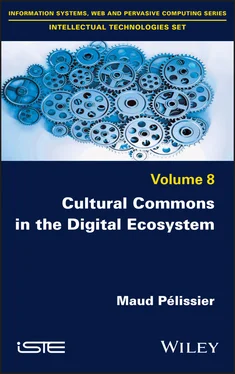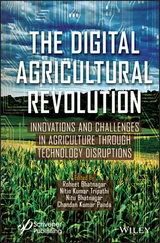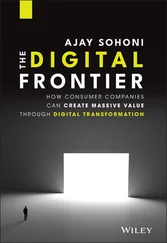Maud Pelissier - Cultural Commons in the Digital Ecosystem
Здесь есть возможность читать онлайн «Maud Pelissier - Cultural Commons in the Digital Ecosystem» — ознакомительный отрывок электронной книги совершенно бесплатно, а после прочтения отрывка купить полную версию. В некоторых случаях можно слушать аудио, скачать через торрент в формате fb2 и присутствует краткое содержание. Жанр: unrecognised, на английском языке. Описание произведения, (предисловие) а так же отзывы посетителей доступны на портале библиотеки ЛибКат.
- Название:Cultural Commons in the Digital Ecosystem
- Автор:
- Жанр:
- Год:неизвестен
- ISBN:нет данных
- Рейтинг книги:4 / 5. Голосов: 1
-
Избранное:Добавить в избранное
- Отзывы:
-
Ваша оценка:
- 80
- 1
- 2
- 3
- 4
- 5
Cultural Commons in the Digital Ecosystem: краткое содержание, описание и аннотация
Предлагаем к чтению аннотацию, описание, краткое содержание или предисловие (зависит от того, что написал сам автор книги «Cultural Commons in the Digital Ecosystem»). Если вы не нашли необходимую информацию о книге — напишите в комментариях, мы постараемся отыскать её.
Cultural Commons in the Digital Ecosystem — читать онлайн ознакомительный отрывок
Ниже представлен текст книги, разбитый по страницам. Система сохранения места последней прочитанной страницы, позволяет с удобством читать онлайн бесплатно книгу «Cultural Commons in the Digital Ecosystem», без необходимости каждый раз заново искать на чём Вы остановились. Поставьте закладку, и сможете в любой момент перейти на страницу, на которой закончили чтение.
Интервал:
Закладка:
coordinated by
Jean-Max Noyer and Maryse Carmès
Volume 8
Cultural Commons in the Digital Ecosystem
Maud Pélissier

First published 2021 in Great Britain and the United States by ISTE Ltd and John Wiley & Sons, Inc.
Apart from any fair dealing for the purposes of research or private study, or criticism or review, as permitted under the Copyright, Designs and Patents Act 1988, this publication may only be reproduced, stored or transmitted, in any form or by any means, with the prior permission in writing of the publishers, or in the case of reprographic reproduction in accordance with the terms and licenses issued by the CLA. Enquiries concerning reproduction outside these terms should be sent to the publishers at the undermentioned address:
ISTE Ltd
27-37 St George’s Road
London SW19 4EU
UK
www.iste.co.uk
John Wiley & Sons, Inc.
111 River Street
Hoboken, NJ 07030
USA
www.wiley.com
© ISTE Ltd 2021
The rights of Maud Pélissier to be identified as the author of this work have been asserted by her in accordance with the Copyright, Designs and Patents Act 1988.
Library of Congress Control Number: 2021934586
British Library Cataloguing-in-Publication Data
A CIP record for this book is available from the British Library
ISBN 978-1-78630-637-1
Introduction
At the dawn of the 21st century, after having long symbolized the inefficiency of shared property, the commons have reappeared in force as an effective principle of social and cultural struggle against the current dynamics of capitalism. It has imposed itself as the banner of various social movements rising up in the four corners of the world against the extension of private property to all spheres of living together. It is at the heart of the anti-globalization movement, where the activist Naomi Klein, at the Porto Alegre Social Forum in 2001 in a famous text, “Reclaiming the Commons”, protested against the privatization of all aspects of life and the transformation of all activity and value into merchandise (natural resources such as education and health). It is regularly found mobilized in environmental movements campaigning for the protection of natural “commons” and the prohibition of access to certain natural resources. The commons are also at the heart of actions to remunicipalize water in certain Italian cities, where the category of common good has been legally recognized alongside that of public property. It thus designates certain categories of resources that must be placed outside the market, managed by a public subject with the participation of citizens. As Pierre Dardot and Christian Laval rightly point out, by uniting disparate forces, the common has gradually become the central category of contemporary anti-capitalism through a resumption of the critique of private property as an absolute condition of social wealth: “What gives meaning to the meeting of these different aspects of the commons in a single designation, is the demand for a new form of ‘community’ and democratic management of common resources that is more accountable, more sustainable and more just” (Dardot and Laval 2014, p. 97, author’s translation).
While the epicenter of the struggle for the commons concerns the protection of common natural resources, it has also spread to the intangibles of the mind. Starting in the 1990s, the strengthening of copyright, the exponential increase in the number of patents filed and the broadening of their scope were perceived as threats to creative dynamics in the artistic, scientific and intellectual fields. Governments and multinational corporations have regularly joined forces to justify the privatization of different forms of knowledge, on the pretext that it was an essential step in the creation of new markets that would bring renewed and sustainable growth.
The emergence and democratization of the Internet as an unprecedented socio-technical ecosystem has opened up a new field of militant struggle for the protection of new forms of commons – sometimes called cultural, information, knowledge or digital – in the face of the threat of disappearance of the creative and sharing dynamics that have been at work since the beginning: “The desire to propose a ‘knowledge society’ that is shared, equitable and capable of responding to the major crises facing our globalized planet has also mobilized new social actors against the ‘knowledge economy’, which wants to turn all knowledge into commodities and install financial models in cultural and scientific practices” (Le Crosnier 2015, p. 235, author’s translation). Here, the threats of “enclosure” of knowledge come from the desire of certain private companies to extend their field of action or to retain control of their industry. In any case, they are perceived as a potential challenge to the right of universal access to the Internet or the right of access to culture.
Here, as elsewhere, the commons embody a collective will to refound the socio-economic order, based on new regulatory principles and other forms of value and wealth creation. In this respect, these militant movements have made intangible resources, such as free software or the Wikipedia encyclopedia. In different fields, these collaborative communities (Rifkin 2016) are the manifestation of the new conditions of production, circulation and consumption of knowledge made possible by the digital ecosystem. They are new ways of writing, memorizing and reading, which, attached to the process of digitizing the sign, converge towards the promise of seeing the emergence of conditions favorable to collective intelligences (Juanals and Noyer 2010). These commons are also based on a conception of shared ownership and community and decentralized governance, symbolizing a pragmatic utopia embodied by the possibility of seeing a new socio-economic system, a new face of capitalism, unfold in the digital ecosystem.
This book proposes to meet these intellectual movements, most of them militant, which have contributed to the emergence of a real thought on the cultural commons in the digital ecosystem. This path will lead us to identify the different intellectual “places” where this thought has emerged, to identify the socio-economic, technical and political stakes associated with it and finally to highlight the conceptual framework that is proposed for this notion, which is still highly nomadic and polysemic. This exploration is an essential prerequisite to shed light on the foundations of this emerging cultural commons economy.
This thinking of cultural commons in the digital ecosystem is plural. While it is possible to bring about a chronology with pioneering figures, a map with places symbolizing its different manifestations, it is pointless to see it as the expression of one and the same current of thought. This will be the guiding thread of the first part of this book, which will lead us to highlight the importance in the genesis of this thought of the commons of two major intellectual movements. The first movement brings together militant American intellectual figures, most of them university jurists, gathered at the Berkman Center for Internet and Society, and recognized for their battle against the enclosure of the intangible commons of the mind since the end of the 1990s. This movement has had a strong resonance and now has many ramifications, particularly in Europe. The second movement also started in the United States, but in a completely different place: at Indiana University, where the economist Elinor Ostrom, recognized for her research demonstrating the sustainability and effectiveness of land commons, started a research program in the mid-2000s on the question of commons in the field of knowledge. She is credited with helping to open up a research front on the issue of scientific knowledge commons and its articulation with a related but independent movement, open access. Her thinking has also resonated beyond her own Bloomington school, as other scholars in other places have taken up the path of her introductory reflection.
Читать дальшеИнтервал:
Закладка:
Похожие книги на «Cultural Commons in the Digital Ecosystem»
Представляем Вашему вниманию похожие книги на «Cultural Commons in the Digital Ecosystem» списком для выбора. Мы отобрали схожую по названию и смыслу литературу в надежде предоставить читателям больше вариантов отыскать новые, интересные, ещё непрочитанные произведения.
Обсуждение, отзывы о книге «Cultural Commons in the Digital Ecosystem» и просто собственные мнения читателей. Оставьте ваши комментарии, напишите, что Вы думаете о произведении, его смысле или главных героях. Укажите что конкретно понравилось, а что нет, и почему Вы так считаете.












